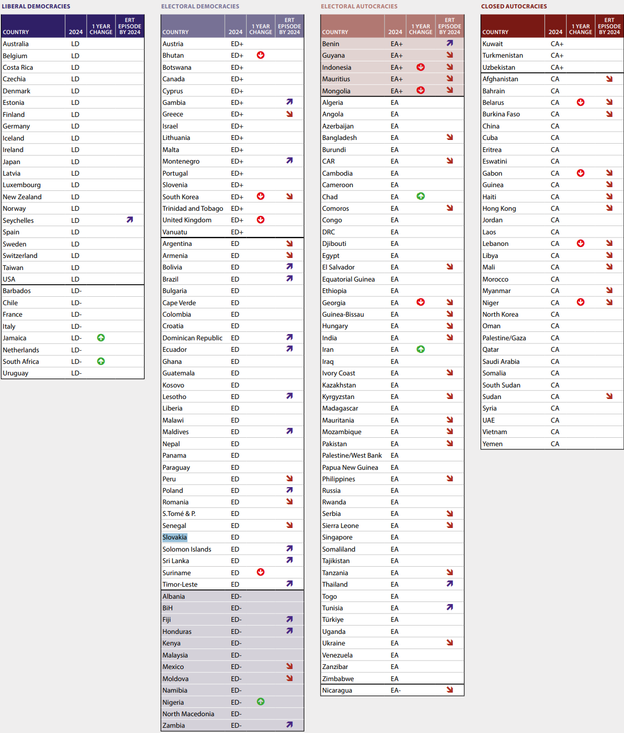Slovakia has reached levels of political division and democratic decline not seen since the 1990s, according to the latest findings of the respected V-Dem (Varieties of Democracy) project, based at the University of Gothenburg in Sweden.
The country has been placed on V-Dem’s “autocratisation warning list” – a group of democratic states considered most at risk of sliding towards authoritarian rule, Sme reported. Researchers say Slovakia’s polarisation is now even higher than during the turbulent era of Prime Minister Vladimír Mečiar, when political conflicts deeply split families and communities.
Sharp drop in democracy score
Slovakia’s score on V-Dem’s Liberal Democracy Index fell from 76.2 out of 100 in 2022 to 58.4 in 2024 — the lowest level since before 1998. In a commentary for the European Consortium for Political Research, academics John Chin and Daniel Hayase of Carnegie Mellon University linked the decline to the fourth government of Prime Minister Robert Fico.
According to the report, the deterioration reflects “Prime Minister Fico’s attempts to consolidate power by undermining judicial independence, attacking civil society organisation, and exerting political control over the media.” It adds: “Slovakia is deeply polarised and remains only a thin margin away from the autocratisation threshold.”
Until 2022, Slovakia was ranked among the “liberal democracies” – states combining free elections with strong institutional checks and protection of individual rights. In 2023 it dropped into the “electoral democracy” category, which recognises that its voting process remains free.
While Slovakia has now been placed on V-Dem’s “autocratisers watchlist”, neighbouring Hungary is already classified as an “electoral autocracy” – a country where elections occur, but lack fairness. According to the V-Dem ranking, both Russia and Ukraine are also “electoral autocracies”. Belarus remains in the “closed autocracy” group, with no meaningful elections.
Polarisation reaches toxic levels
The V-Dem report highlights deepening political polarisation as a key factor driving democratic decline. In highly polarised societies, citizens may be willing to sacrifice democratic principles to ensure victory for their political camp.
Polarisation, in V-Dem’s definition, means persistent and intense political conflict where opponents are perceived not as rivals but as existential threats. The report warns that Slovakia now exhibits a “toxic” level of division, exacerbated by the government’s use of disinformation.
Findings from Slovakia’s DEKK Institute, which uses V-Dem data, show the country is the second most polarised in Europe, behind only Hungary.

Related article
Slovakia faces one of the world’s highest levels of polarisation, study finds
Read more
Wider European concern
Slovakia’s rapid democratic backsliding is part of a broader trend affecting several EU states. While some countries have maintained or strengthened democratic safeguards, others – particularly those with rising populist movements – have seen declines in judicial independence, media freedom and civil society space.
For Slovakia, the combination of institutional erosion and unprecedented polarisation poses a serious risk. As the V-Dem researchers note, the country remains a democracy for now, but is “only narrowly” above the point where autocratisation begins.

